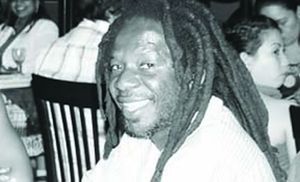Ras Willie
Ras Willie | |
|---|---|
 | |
| Birth name | William Wamudambo Mbewe |
| Born | 1965 |
| Died |
2014 02, 12 (aged -1953) Lusaka, Zambia |
| Genres | Reggae |
Ras Willie (born William Wamudambo Mbewe) was a Zambian reggae musician, composer, songwriter, percussionist and music engineer. He was acclaimed for being part of the very fabric that laid a firm foundation upon which Zamrock and other forms of Zambian music were developed.
Early life
Ras Willie was born William Wamudambo Mbewe in 1965 in Kabwe. He was born in a family of musicians. His father is said to have been playing music to the local community during beer parties and his brother Chris was part of the WITCH band during the Zamrock era. In the mid 1980s he changed his name to Ras Willie after listening to the sounds of Burning Spear, Israel Vibration and Bunny Wailer, and ultimately embracing Rastafarianism.
He later left Mungwi Technical High School in Northern Province and joined the WITCH as their Road Manager. When his brother left for Botswana, he too followed suit, and together with Alex Kunda of the Mosi-Oa-Tunya Band, they formed the Afro Sunshine Band with members drawn from Zambia, Botswana, South Africa and Zimbabwe. He later broke from the band and became a co-founder member of the ‘’Mango Jam’’ band in South Africa.
Musical career
His style of music was a unique and energetic reggae style which blended jazz, rock, ska and rumba. He also had influences from the likes of Keith Mlevhu, Blackfoot, Peace, Tinkles and Five Revolutions as well as WITCH, where his brother, the late Chris “Kims” Mbewe was the lead guitarist. As road manager for WITCH band, Ras Willie got a lot of Zamrock influence and fused it into his music.
His biggest break came in 1986 while in Botswana when he appeared with a British reggae/pop group UB40 at a show. “It was a big surprise when I appeared with UB40 and we performed along with a Zambian band, the Broadway Quintet and Afro Sunshine where my brother Chris was and Maluba,” Ras Willie explained to the Times of Zambia in an interview.
Later, he crossed into South Africa where he continued gaining exposure and played alongside the likes of late Lucky Dube. It was while in South Africa that he clinched a record deal with Gallo Records, which probably made him the first Zambian to get an international recording contract.
A story in the St Loius Post Dispatch in 1993 read:
“A major perk of any record reviewer is the possibility of discovering music that most certainly would be overlooked otherwise. Case in point is a recent package from South Africa which contained Songs of Joy by Ras Willie.
“Beginning with the intense Rub-A-Dub-A-Musica, the eight tracks on Songs of Joy are relentless. Willie’s emotionally-charged vocals are accented with plenty of horns, infectious beats, dynamic drumming and scorching lead guitar (courtesy of George The Greek). The tunes are above average in length and each becomes an exercise in this reggae-fusion style.
“This superb release is Ras Willie’s debut. If you dare to give new sounds a chance, this powerful disc will knock you out. If you can’t find Songs of Joy, order it. It’ll be worth your while.”
When his brother Chris died in Botswana, Ras Willie returned home and stayed on after the funeral. It was at this time he decided to settle back in Zambia and continued his music.
Res Willie also served as Lusaka Province chairman for the Zambia Association of Musicians (ZAM).
Discography
- Mango Jam (with Mango Groove)
- Songs of Joy — 1993
- Luba Lunda — 2001
- Luba Lunda II: Sweet Africa — 2006
Songs of Joy album (1993)
In 1993, Willie released the album Songs of Joy and was was distributed the world over by Teal Records. The album hit number one in Japan on the African music charts and went as far as hitting the record stores in Jamaica.
Luba Lunda album (2001)
His 2001 album Luba Lunda won him several awards including Best Traditional National Award at the AZAMI Awards and a nomination at the Kora All Africa Music Awards. The title-track of the album talks about the Luba-Lunda migration with Ras Willie saying music was inspired by the mystics of Mwata Kazembe and the Mutomboko dance.
Awards and nominations
| Year | Association | Category | Result |
|---|---|---|---|
| AZAMI Awards | Best Traditional National Award — Luba Lunda Kingdom | Won | |
| 1997 | KORA All Africa Music Awards | Best Traditional Award — Luba Lunda | Nominated |
Death
A week before his death, he asked for friends to remember to pray for his mother who he said was not feeling well. Within that same week, he expressed sadness at the passing on of former National Soccer Team striker Dennis Lota.
Ras Willie died on 12 February 2014. His death came shortly after he released his third album, Ras Willie and the Kings Rhythms Original Sounds of Zambia in Jazz.[1]
He was survived by a wife and five children.[2]
Main references
- Ras Willie: The kings rhythm is no more, Lusaka Voice, 12 February 2014
References
- ↑ Ras Willie: The kings rhythm is no more, Lusaka Voice, 12 February 2014
- ↑ FAREWELL RAS WILLIE, Times of Zambia, 14 February 2014